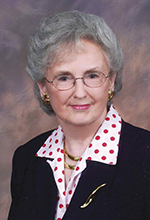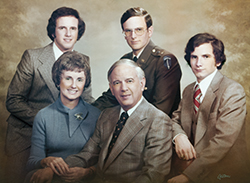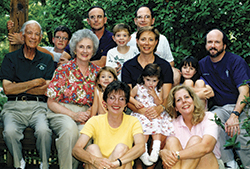|
Rosemary Dietrick Looks Back at Travel
Across the Commonwealth
'In Virginia, the Open Road Never Disappoints'
Story by Bill Sherrod
A quarter-century-old tradition ended earlier this year,
when longtime Cooperative Living travel writer Rosemary Dietrick set her pen
and pad aside to take a much-deserved breather.
 |
| Rosemary
Dietrick |
Dietrick, whose “Rural Retreats” and “Across the
Commonwealth” columns entertained and informed electric cooperative members
across the state, wrote her final travel piece for the magazine in February,
a cover feature on romantic destinations for winter-weary Virginians.
The story ended a 25-year run for Dietrick, a span that
began with a review of a bed-and-breakfast inn on the Northern Neck
published in the July 1989 issue of Rural Living, which was renamed
Cooperative Living in 2000. That column, “Rural Retreats,” became a
recurring feature in the magazine for the next 15 years, and profiled cozy
getaway-style inns across the state.
Rosemary’s accomplice in the Rural Retreats reviews was
husband Bill Dietrick, himself well known to Rural Living readers as an
occasional guest editorial columnist. Together the Dietricks visited dozens
of inns, Rosemary providing her colorful verbal stylings while Bill and his
trusty Nikon camera created the imagery for the Rural Retreats columns.
It was an ideal team setup, using the combined talents of
Rosemary, an accomplished wordsmith and English and French teacher at St.
Bridget’s and St. Gertrude’s schools in Richmond, and Bill, a
public-relations practitioner and University of Richmond professor.
 |
| Rosemary and
Bill Dietrick with their three sons in the
mid-1970s. |
A native of Philadelphia, Pa., Rosemary was in college at
Immaculata University when she met Bill, a student at Villanova, just down
the road. “We dated for three years, then married a couple of years after
college,” notes Rosemary. After graduation, Rosemary worked for J.B.
Lippincott & Co., the publishing house that published Harper Lee’s To Kill a
Mockingbird. In her first job and every job since, words have held a special
fascination for Rosemary.
The couple moved to Richmond in
1954, while Bill was serving in the U.S. Marine Corps, to set down roots and
start their family. Bill had his first work in public relations after being
approached about doing some P.R. work for the agriculture department of Gov.
Albertis S. Harrison, Jr.’s administration. He later worked
stints for the New York public-relations firm
Selvage & Lee, then for Richmond Hotels, the Tobacco Tax Counsel, and
eventually went on to teach public relations at the University of Richmond,
and was a founder of the Public Relations Council in Richmond.
Rosemary, meanwhile, was busy raising the couple’s three
sons, Michael, Timothy and Dennis, and teaching, first at St. Bridget’s
School in Richmond, and later at St. Gertrude’s. She also worked for the
Catholic Diocese of Richmond as assistant to the director of the Bureau of
Information. Along the way she went back to school and earned a master’s
degree in English at the University of Richmond.
 |
| The Dietrick family in the 1990s. |
In 1989, Rural Living editor
Richard Johnstone approached the couple about doing a regular feature on
local bed-and-breakfast inns across Virginia. The Dietricks liked the idea,
and Rural Retreats was born. Their team approach included Rosemary’s stories
and Bill’s imagery.
The Dietrick team continued
collaborating on Rural Retreats until Bill passed away 10 years later, in
August 1999. Daughter-in-law Roxanne volunteered to become photographer and
designated driver. In 2004, the magazine’s editors asked Rosemary to expand
her travel writing to a broader scale, and Across the Commonwealth was born.
Rosemary’s Across the Commonwealth columns were published regularly
― sometimes as cover features — until February
this year.
So, after many words and many deadlines during 25 years
of travel writing, Rosemary graciously agreed to share with our readers some
insights on travel in the Commonwealth of Virginia. Following are her
parting observations.
Destination: Virginia
A conversation with Rosemary Dietrick
How has the travel industry in Virginia
changed in your years as a travel writer?
The Internet has been a powerful influence, making the
marketing of attractions and lodging facilities so much simpler. Innkeepers
can now tell the world about their properties via their websites, then
reserve accommodations instantly. For potential guests, information is
immediately available with no problems on arrival.
The extraordinary growth of the Virginia Film Office has
been a boon to tourism in the Commonwealth. Steven Spielberg’s hit movie,
“Lincoln,” filmed in Richmond and Petersburg, brought Hollywood actors and
crews to local hotels, bed and breakfasts, restaurants, and businesses.
Let’s not forget the bonus of blockbuster publicity for the sites used in
the production of the film.
Then, too, there’s the GPS device, the salvation of
travelers lost on back roads. Would that Marco Polo had had a GPS!
What are three of
your favorite travel destinations?
When it comes to geography, Virginia has it all, from the
Alleghenies to the Atlantic Ocean and the Chesapeake Bay — with rolling
vineyards and charming Main Street towns in between. Historic Fort Monroe
offers a dramatic setting, surrounded by Hampton Roads with its backdrop of
passing ships and submarines. At one end of a sweeping parade ground, a
gazebo waits for the band’s arrival. Farther inland, cross a moat to visit
the fort’s museum, formerly a prison, where one cell housed Jefferson Davis.
Bring your camera. Roxanne was intrigued. She took more than her usual
number of great pictures there. It’s that kind of place.
Highland County, at the top of Virginia, is a special
retreat. No interstate exit ramp leads the way into the town of Monterey.
What you get are hairpin curves and fantastic vistas courtesy of Allegheny
Mountains named Shenandoah, Bullpasture, and Jack. Sitting on the wraparound
Eastlake porch of the very Victorian Highland Inn (circa 1904) is the only
way to end the day after exploring nearby McDowell or the lush Blue Grass
Valley.
For city life in the country, no one should miss
Lexington, home to the Virginia Military Institute and Washington & Lee
University. Call the ambience “rural sophistication” with its shops and
restaurants bustling with students and visiting parents. Hollywood came
calling to film Jodie Foster and Richard Gere in the period movie “Sommersby.”
Tour Stonewall Jackson House and Robert E. Lee chapel. Friday afternoon
parades at VMI are a must.
What about the country inns — what makes them
successful?
Owners of successful country inns and bed and breakfasts
do everything right. They work hard to maintain the charm and attractiveness
that impressed guests at the inn’s debut. If they serve dinner, the food is
noteworthy. Guest appreciation is in the details. But your hosts don’t
hover. After all, you’ve come to the country for peace and quiet. However,
he or she should be on hand to help. Over the years, they add amenities or
expand their property. The perfect host is always “on,” ready to open the
door with a smile.
What has been your most memorable story?
The Civil War Legacy Project enabled families in bringing
letters and documents to designated places around the state to be scanned by
Virginia State librarians. The goal was the preservation of priceless,
privately owned remnants of the Civil War era.
At one session, people came with as many as 300 images to
be scanned:
Bibles, discharge papers, and paroles. One item stood out
— it was an 1860 VMI diploma signed by Professor Stonewall Jackson. One
woman brought a faded clipping from a western newspaper which, when thrust
into cyberspace, could be the key to a family reunion. It was poignant,
seeing all that family history spill out of bulging scrapbooks.
Who are your favorite writers?
I like both fiction and non-fiction, but I look for
authors who paint vivid pictures of settings. Virginia’s David Baldacci has
written over 20 books since his first blockbuster, Absolute Power. He sets
many of his plots in Virginia. Adriana Trigiani just finished directing the
movie “Big Stone Gap,” based on her book about southwest Virginia. I admire
the narrative style of Laura Hillenbrand who wrote the bestsellers,
Seabscuit and Unbroken.
What advice would you give to an aspiring
writer?
Read, read, read! Read other writers for their style. To
produce your best prose, use the language in your toolbox — metaphors,
alliteration, cadence and so forth. Show, don’t tell. Avoid clichés. Use
active voice. Omit needless words.
Be open to serendipity. An unexpected opportunity might
reap the reward of a wonderful idea. Details are important. Read your copy
aloud — rough spots will jar your ear. Attend workshops. Network.
What is memorable about the
Cooperative
Living experience and what do you enjoy most about travel?
In Virginia, life is always a
staycation, full of getaways and attractions to suit every taste. The
magazine (then Rural Living) gave a Philadelphia urbanite the opportunity to
explore so many pockets of country life. The sites were diverse; the people
welcoming. I remember Eastern Shore sunsets, Monticello in spring, wine
tastings, and eagle sightings on the Rappahannock River. The farm-to-table
movement was just getting started. Tree houses as lodging? Really?
Travel offers that element of surprise. Anticipation
builds. In Virginia, the open road never disappoints.
|